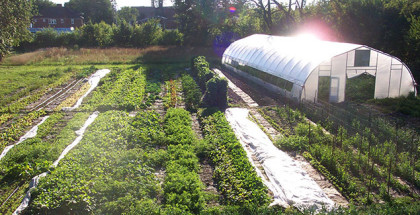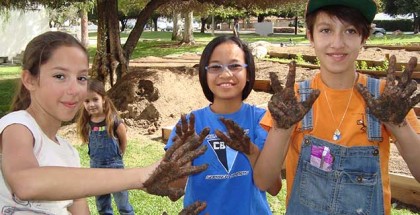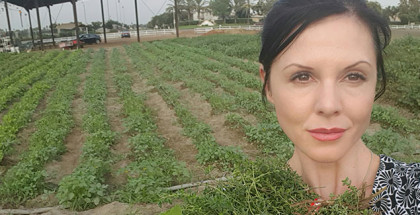Conference News
Study Finds Two Thirds of Urban Farmers Have a Social Mission that Goes Beyond Food Production
March 2, 2016 | seedstockNews Release – Two thirds of urban farmers have a social mission that goes beyond food production and profits, finds new research led by NYU Steinhardt School of Culture, Education, and Human Development.
The study, published in the British Food Journal, shows that three of the four top reasons farmers grow in urban areas – food security, education, community building, and producing food for the market – have social motivations.
As urban populations grow in the United States, farming in cities is becoming more common. While food entrepreneurs seek to make money through urban farming, many urban farms are concerned with factors beyond food production, and have incorporated social goals into their missions. These missions align with a larger social movement in food – the “good food movement” – that focuses on where food comes from, who grows it, and how it’s grown. Read More
Can Urban Agriculture Thrive in the U.S.? A Look at the Potential of Five Cities to Feed Themselves
February 26, 2016 | Davina van Buren
Food Field is a for profit 4-acre urban farm based in Detroit that was founded in 2010 by Noah Link and Alex Bryan. Photo Credit: Food Field.
Unless you’ve been living under a rock, you know that urban agriculture—the practice of cultivating and distributing food in population-dense areas—is all the rage.
As Americans learn more about our food system and how it affects our health and the environment, many city-dwellers are looking for alternatives to pesticide-laden fruit and vegetables, GMOs and CAFOs.
In response, many farmers have turned to cultivating in cities to take advantage of the market demand for locally grown crops. And ordinary citizens are taking it upon themselves to learn how to grow their own food. Read More
Pro Golfer Leaves Links to Pursue Promise of Greener Urban Farming Pastures
February 25, 2016 | Davina van Buren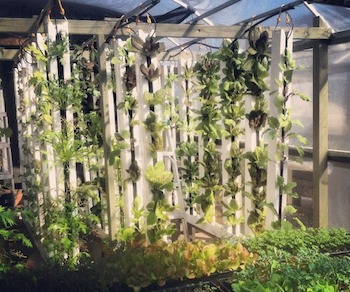
Aquaponic green walls (pictured here) are an integral part of Murietta, CA-based urban farming company, Urban Food Works’ business model. Photo courtesy of Mike Lott.
Mike Lott is not your run of the mill farmer. Not long ago, before making the decision to embark on a career in farming and launch his aquaponic and urban agriculture venture, Urban Food Works in Murietta, CA, Lott was a professional golfer.
As a kid growing up in southern California, he didn’t awake early in the morning to milk and feed cows, harvest crops, or turn the soil. Instead, he honed his golf game in anticipation of one day playing professionally. After high school Lott headed to the College of the Desert in Palm Desert not only because of its well-known golf program, but also to study Environmental Science. It was there that the seeds of Lott’s interest in and current passion for urban farming and the environment were sown. Read More
New UC Riverside Enterprise Crosses Disciplines to Improve Local and Global Food Production Systems
February 24, 2016 | AJ Hughes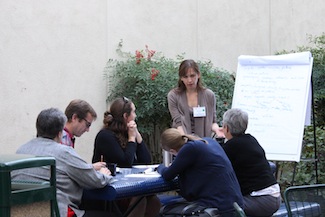
Participants at a California Agriculture and Food Enterprise planning workshop discuss its future goals and aims. (photo courtesy Don Davidson/University of California, Riverside)
With a strong emphasis on research, the California Agriculture and Food Enterprise (CAFE) at the University of California at Riverside has a mission to improve food production systems, stimulate food and agriculture teaching and develop an interdisciplinary food systems curriculum.
Drawing upon the expertise of faculty and staff from UCR’s College of Natural and Agricultural Sciences, University of California Extension and Agricultural Experiment Station, CAFE aims to link with people from other UCR colleges and departments who work in areas pertaining directly or indirectly to agriculture.
“[CAFE] transcends a single discipline,” says CAFE founder and genetics professor Norman Ellstrand. “People in social sciences are interested in food deserts.” Read More
Agriculture Key to California Economic Summit’s ‘One Million Challenge’ for Workers, Water and Homes
February 23, 2016 | AJ Hughes
Trees are pruned for backyard orchards at Hayes Valley Farm, a community-built farm on San Francisco’s former Central Freeway. Agriculture in both rural and urban areas is a key component of the California Economic Summit’s 2016 roadmap to economic prosperity. (Wikimedia Commons photo)
In November 2015, the fourth California Economic Summit took place in Ontario, located in Southern California’s Inland Empire. Agriculture was a key component of the vision outlined at the event, which is designed to spur economic growth in the Golden State.
The event is put on by the California Stewardship Network, a group promoting economic vitality and California Forward, a bipartisan government reform initiative.
“The first economic summit did not include agriculture, which was a large frustration,” says Glenda Humiston, vice president of University of California Agriculture and Natural Resources and co-lead of the Summit’s Working Landscapes Action Team along with A.G. Kawamura, an urban farmer from Orange County. “The following year, we advocated for a Working Landscapes action team.” Read More
To Break Cycle of Poverty, Uncommon Local Organization Sees Solution in Urban Agriculture
February 22, 2016 | Anne Craig
Photo courtesy of Uncommon Good.
In 2011, Nancy Mintie, founder of Claremont, CA-based Uncommon Good saw in urban agriculture an opportunity to help fulfill her organization’s mission to break intergenerational poverty cycles and give people the tools to lift themselves up. Mintie says her embrace of urban agriculture in Uncommon Good’s ongoing efforts to promote health, wellness, education and sustainability was a matter of leveraging a resource that had been right under her nose.
The seed was planted during the recession.
“We’d been doing education and social services work, and we saw the level of hardship just skyrocket,” she says. “We were seeing a reverse migration since people were now starving here as badly as they had been back home in Mexico.”
Hope was in short supply.
So Mintie started with the idea that a community garden could, at least, get people fed; but her clients had their doubts. Read More
L.A. Food Policy Council Outlines Path to Fresh Food for All in the City of Angels
February 17, 2016 | AJ Hughes
A blighted vacant lot is seen in Los Angeles. Through urban agriculture incentive zones, the Los Angeles Food Policy Council wants to see more vacant blighted land transformed into thriving urban farms and gardens. (Photo courtesy Camille de la Vega/Los Angeles Food Policy Council)
Imagine a world-class metropolis where people take their relationships with food so seriously that all citizens enjoy access to farmers’ markets. The notion of food waste is obsolete (instead, think food capital). Farms and gardens thrive where vacant lots once languished and the streets are alive with an astounding variety of food vendors.
That’s a vision that the Los Angeles Food Policy Council (LAFPC) is working hard to make a reality in the City of Angels. To make food access more equitable for all, LAFPC is stressing four equity initiatives which focus on urban agriculture incentive zones, sidewalk food vending, food waste recycling and compost, and accessible farmers’ markets. Read More
To Grow Movement, Riverside Chef Makes 100 Percent Fresh, Local Produce Menu’s Main Event
February 10, 2016 | AJ Hughes
Fresh local produce adds a mighty splash of color to the kitchen inside Health’s Kitchen restaurant in Riverside, California. (Photo courtesy Robin Meadows/Health’s Kitchen)
For some, the word “local” can be ambiguous. But Health’s Kitchen restaurant in Riverside, California, has strict rules regarding where it obtains its produce. Ideally, it must come from farms located in the City of Riverside, and when this isn’t possible, only Riverside County farms will suffice.
“Fresh produce is the main event on the menu,” says Health’s Kitchen co-owner Robin Meadows. “There are a few restaurants that obtain some of their food locally, but we get 100 percent of our produce from local farmers.” Read More

